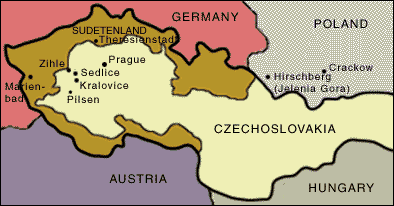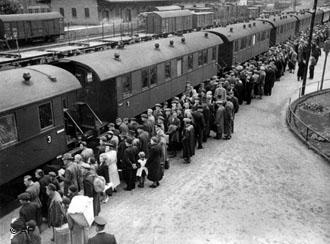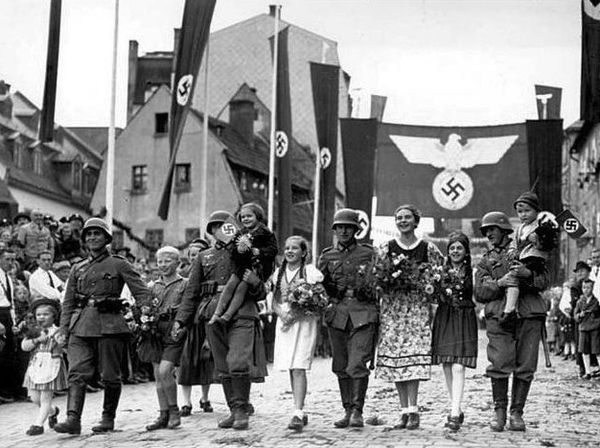How the Sudeten Germans wound up in Occupied Germany - 1945-1946
Sep 21, 2015 20:19:03 #
For centuries, Germans and Czechs fought each other for control of the region known now as Czechslovakia. On October 28, 1918, as the Austro-Hungarian Empire disintegrated in the First World War, a union of Czechs and Slovaks in Paris proclaimed the formation of the independent Republic of Czechoslovakia.
Millions of outraged ethnic Germans in the Sudetenland were not consulted. The new nation aligned with France against future German aggression.
Unfortunately, that alignment collapsed in the infamous Munich Conference of September 30, 1938. Hitler strong-armed French Prime Minister Daladier and British Prime Minister Chamberlain into agreeing that Nazi Germany had the right to annex the Sudetenland. The Sudeten Germans -- more than two million -- enthusiastically embraced them.
The rest of Czechoslovakia was "annexed" six months later, forcing the government to flee to Britain.
As World War II exploded, the Czech government-in-exile was joined in Britain by Poland, France, Denmark and other governments-in-exile. All of them understandably vowed revenge on their traitorous ethnic German populations.
At the victorious Potsdam Conference in August, 1945, the Allies agreed to participate in the postwar mass expulsions to Germany of an estimated 12 million ethnic Germans (aka Volksdeutschen) from Poland, Czechoslovakia, Hungary, France, Holland, etc.
But somehow, only the Czechs are mentioned today, despite the fact that Poland alone deported more than the Sudeten German total. All of the ethnic German enclaves in Europe were emptied. Many villages remain eerily abandoned to this day.
In April, 1945, Czechoslovakia was liberated from the East by Russia, and from the West by General Patton's Third Army, The Americans held Sudetenland. Their sector line ran through Cheb, Pilsen, and Cesky Krumlov. Patton was ordered to stay away from Prague.
Because the Sudeten Germans outnumbered the local Czechs by ten to one, the Americans imposed Military Government instead of treating them as liberated.
Publicly, the restored Czech government stated they wished both the American and Soviet troops to leave. Privately, the Czechs asked the U.S. to remain as long as the Russian troops stayed. Both armies withdrew in December, 1945.
In November, 1945, the Czechs and Berlin's Four Powers Allied Control Council organized a "Transfer Program." Ethnic German deportees were collected and trucked by the Czech army into a network of 107 assembly camps, from which they were transported by train (1,200 persons per "shipment) to German border stations for transfer to Allied authorities. The U.S. Occupation Zone had 13 reception/distribution centers.
Starting in January, 1946, one train per day arrived at the Czech border. That gradually increased to as many as 12 trains (14,400 Germans) per day, except Sundays. The transfers involved 6,580 locomotives and 67,748 railcars.
During 11 months -- January through November, 1946 -- more than 1.3 million ethnic German men, women and children surged from Czechoslovakia into the American Occupation Zone, where they were not welcome. Another 636,482 Germans went to the Soviet Zone.
Officially, ethnic German deportees did not qualify as Displaced Persons and received no American or international aid.
Millions of outraged ethnic Germans in the Sudetenland were not consulted. The new nation aligned with France against future German aggression.
Unfortunately, that alignment collapsed in the infamous Munich Conference of September 30, 1938. Hitler strong-armed French Prime Minister Daladier and British Prime Minister Chamberlain into agreeing that Nazi Germany had the right to annex the Sudetenland. The Sudeten Germans -- more than two million -- enthusiastically embraced them.
The rest of Czechoslovakia was "annexed" six months later, forcing the government to flee to Britain.
As World War II exploded, the Czech government-in-exile was joined in Britain by Poland, France, Denmark and other governments-in-exile. All of them understandably vowed revenge on their traitorous ethnic German populations.
At the victorious Potsdam Conference in August, 1945, the Allies agreed to participate in the postwar mass expulsions to Germany of an estimated 12 million ethnic Germans (aka Volksdeutschen) from Poland, Czechoslovakia, Hungary, France, Holland, etc.
But somehow, only the Czechs are mentioned today, despite the fact that Poland alone deported more than the Sudeten German total. All of the ethnic German enclaves in Europe were emptied. Many villages remain eerily abandoned to this day.
In April, 1945, Czechoslovakia was liberated from the East by Russia, and from the West by General Patton's Third Army, The Americans held Sudetenland. Their sector line ran through Cheb, Pilsen, and Cesky Krumlov. Patton was ordered to stay away from Prague.
Because the Sudeten Germans outnumbered the local Czechs by ten to one, the Americans imposed Military Government instead of treating them as liberated.
Publicly, the restored Czech government stated they wished both the American and Soviet troops to leave. Privately, the Czechs asked the U.S. to remain as long as the Russian troops stayed. Both armies withdrew in December, 1945.
In November, 1945, the Czechs and Berlin's Four Powers Allied Control Council organized a "Transfer Program." Ethnic German deportees were collected and trucked by the Czech army into a network of 107 assembly camps, from which they were transported by train (1,200 persons per "shipment) to German border stations for transfer to Allied authorities. The U.S. Occupation Zone had 13 reception/distribution centers.
Starting in January, 1946, one train per day arrived at the Czech border. That gradually increased to as many as 12 trains (14,400 Germans) per day, except Sundays. The transfers involved 6,580 locomotives and 67,748 railcars.
During 11 months -- January through November, 1946 -- more than 1.3 million ethnic German men, women and children surged from Czechoslovakia into the American Occupation Zone, where they were not welcome. Another 636,482 Germans went to the Soviet Zone.
Officially, ethnic German deportees did not qualify as Displaced Persons and received no American or international aid.
Arc-shaped Sudetenland region of Czechoslovakia

Sudeten ethnic Germans board deportation trains to Occupied Germany - 1946

Nazi troops welcomed into Sudetenland - 1938

Sep 22, 2015 07:58:53 #
Sep 22, 2015 10:28:50 #
Sep 22, 2015 13:16:15 #
My wife comes from Ausig, now (Usti), not only the German
speaking Sudeten Deutche, but also the Donauschwaben, and
the people of the Batchka, where either killed or driven from their lands. Wde where stuck in Rommania in the town ofTriebswetter,
now known as Tomnatic, and where purged by the communists, we fled and got back to the US.
speaking Sudeten Deutche, but also the Donauschwaben, and
the people of the Batchka, where either killed or driven from their lands. Wde where stuck in Rommania in the town ofTriebswetter,
now known as Tomnatic, and where purged by the communists, we fled and got back to the US.
Sep 22, 2015 22:51:32 #
Very pleased to get your historical information and map regarding this region, evidently from your direct experience. Your earlier comments are appreciated as well. I'm doing some research re. Slovakia at the end of the 19th and early 20th centuries, a bit east of the Sudetenland. Carl Schorske, a famous 100 year old scholar of the period died just last week. They say his well-known book,which I have yet to read, is excellent.The history of the region, especially the farm country, speaks to the geographic heart of Europe.
Sep 23, 2015 00:01:43 #
rvenegas wrote:
Very pleased to get your historical information an... (show quote)
Thank you for your comments. I recommend a scholarly book published in 1964 by the New York University Press. Written by Dr. Radomir Luza. The title is "The Transfer of the Sudeten Germans -- A Study of Czech-German Relations" (365 pages). Dr. Luza was a 16-year-old son of a Czech general when the Sudetenland was ceded to Hitler in the 1938 Munich Conference. He was a member of the Czech Resistance in WW II, and later a member of the Czech government-in-exile. He holds a law degree from Masaryk University in Brno. He emigrated to the U.S.A. in 1953 and in 1957-58 was a Fels Fellow in History at New York University.
Sep 23, 2015 00:52:06 #
William J Renard wrote:
My wife comes from Ausig, now (Usti), not only the German
speaking Sudeten Deutche, but also the Donauschwaben, and
the people of the Batchka, where either killed or driven from their lands. Wde where stuck in Rommania in the town ofTriebswetter,
now known as Tomnatic, and where purged by the communists, we fled and got back to the US.
speaking Sudeten Deutche, but also the Donauschwaben, and
the people of the Batchka, where either killed or driven from their lands. Wde where stuck in Rommania in the town ofTriebswetter,
now known as Tomnatic, and where purged by the communists, we fled and got back to the US.
The records of expulsions of ethnic Germans from the Balkan countries are hardly reliable, because of the turmoil and confusion resulting from conditions which you apparently personally experienced. One source quotes Rumania as having ejected more than 110,000 Germans, while Hungary expelled over 200,000. Yugoslavia also expelled 200,000-plus. But these countries also interned thousands of Germans without bothering to share records with the non-Communist governments. Countless ethnic Germans suffered beatings, rape, and even death as retribution for atrocities committed in the Balkans by the Nazis.
Sep 23, 2015 00:56:01 #
Franku wrote:
Very interesting.
I'm pleased you found these facts informative. Thank you for your appreciation.
Sep 23, 2015 01:03:51 #
nikonwaddy wrote:
Fascinating story....then what happened ?
Thank you for your comments. I'm compiling another little 500-word report on the subsequent conditions in Occupied Germany, resulting from all these unwanted ethnic German refugees. One interesting facet is the confusion about which refugees were really Sudentens. It soon became clear that authorities were listing everybody as a Sudeten German if they came into Occupied Germany through Czechoslovakia.
Sep 23, 2015 11:22:24 #
If you look up the German Population of the Banat, you will find
that they are some that are predominantly Alcesian, Loraine
Germans, who have been in the area since the ouster of the Ottomans, The names of the people in our town of Triebswetter
predominantly had French names, not until the 1800 did they switch to German, as things progressed they all became
bi-lingual, German and Hungarian, some of the elder people
still spoke french, and the dialect of German that they spoke,
contained both German French and Hungarian words.
In Sebu Rommania, The town originaly was Hermanstadt
that they are some that are predominantly Alcesian, Loraine
Germans, who have been in the area since the ouster of the Ottomans, The names of the people in our town of Triebswetter
predominantly had French names, not until the 1800 did they switch to German, as things progressed they all became
bi-lingual, German and Hungarian, some of the elder people
still spoke french, and the dialect of German that they spoke,
contained both German French and Hungarian words.
In Sebu Rommania, The town originaly was Hermanstadt
Sep 23, 2015 18:08:45 #
Sep 23, 2015 22:56:08 #
raymondh wrote:
I sure do appreciate your history lessons!!
Thank you for your comments, raymondh, they are appreciated. Here's an addition that might interest you. Czechoslovakia was conceived in Pittsburgh, PA, USA in 1918, months before it was proclaimed in Paris. Hundreds of thousands of Slovaks had immigrated to Pittsburgh to work in the steel mills, making that area the second largest U.S. community of eastern European immigrants (Chicago was the largest). On January 31, 1918, President Woodrow Wilson addressed Congress with his "Fourteen Points," urging Europe to inaugurate a "new world order" of "self-determination" to replace the disintegrating Austro-Hungarian regime. A group of prominent Czechs and Slovaks met and drafted a formal document -- only six sentences long! -- called the "Pittsburgh Agreement" and signed it on May 31, 1918. It called for "a republic with a democratic constitution" and recognized both Czech and Slovic as the official languages. The leader of the group, Thomas Masaryk, met with President Wilson and then stood on the steps of Philadelphis's Independence Hall to declare Czechslovakia's independence from Austria-Hungary. In October he proclaimed it formally in Paris, and in January, 1919. the Paris Peace Conference recognized the new nation. Masaryk became its first president until 1935. He died in 1937 at age 87, a year before the Munich Conference.
Sep 23, 2015 23:30:51 #
Very fine: a good encapsulation of the beginnings of Czechslovakia pointing out the irony of its being a nation conceived not on its own soil but in far-away America. Waves of Czech and Slovak immigrants--former Austro-Hungarians--have by now become fully assimilated on these shores in a constructive way, and one can hope they never lose a sense of their origins. The book by Schorske I mentioned previously is "Fin-de Siecle Vienna," which is evidently in English and might be a good foundation to understand the following period.
If you want to reply, then register here. Registration is free and your account is created instantly, so you can post right away.


